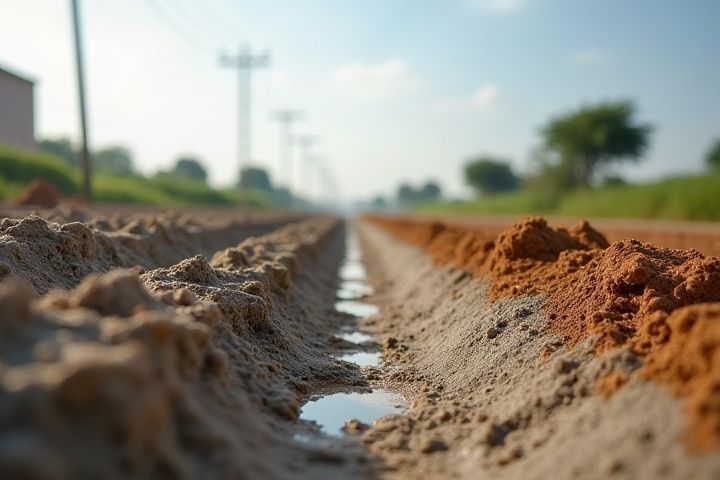
Infrastructure development in Nigeria plays a critical role in enhancing economic growth and improving living standards. The nation faces challenges such as inadequate transportation networks, unreliable power supply, and limited access to clean water. Recent initiatives include the construction of modern highways, bridges, and railways aimed at boosting connectivity between urban and rural areas. Investments in renewable energy sources are also underway to address the electricity supply crisis, with solar and wind energy projects gaining traction. With continued focus on public-private partnerships, the potential for transforming Nigeria's infrastructure landscape is significant, promising a more prosperous future for its citizens.
National Integrated Infrastructure Master Plan
Nigeria's National Integrated Infrastructure Master Plan (NIIMP) serves as a strategic framework aimed at enhancing the nation's infrastructure across various sectors, including transportation, energy, and water resources. By prioritizing investment in critical areas, the NIIMP targets sustainable development that aligns with economic growth objectives. Your engagement in local projects can contribute to the success of this plan, fostering public-private partnerships to improve overall infrastructure quality. Ultimately, the NIIMP envisions a resilient and interconnected Nigeria that can support its rapidly growing population and drive industrial competitiveness.
Public-Private Partnership Initiatives
Infrastructure development in Nigeria increasingly emphasizes Public-Private Partnership (PPP) initiatives, which leverage both public investments and private sector efficiency. By engaging private entities, the government aims to enhance the construction and management of essential services such as roads, railways, and energy systems. These collaborations facilitate access to capital, innovation, and technical expertise, addressing Nigeria's critical infrastructure deficits. Your involvement in such initiatives can significantly accelerate project execution and improve service delivery, ultimately contributing to sustainable economic growth.
Road and Highway Network Expansion
Nigeria's infrastructure development prioritizes the expansion of its road and highway network to enhance connectivity and stimulate economic growth. Key projects include the construction of new expressways and the rehabilitation of existing roads, aimed at reducing travel time and improving safety for commuters and freight transport. Investments in road infrastructure are expected to bolster trade, facilitate access to remote regions, and attract foreign investment. With a modernized highway system, you can expect increased efficiency in transportation, positively impacting various sectors of the economy.
Lagos-Ibadan Railway Project
The Lagos-Ibadan Railway Project plays a crucial role in Nigeria's infrastructure development, significantly enhancing transportation efficiency between two major economic hubs. Designed to improve freight and passenger services, this standard gauge railway spans approximately 156 kilometers, reducing travel time and boosting regional trade. With multiple stations along the route, including at Lagos, Ibadan, and other intermediary areas, it facilitates easier access to markets and fosters economic growth. Investing in such rail infrastructure not only modernizes Nigeria's transport network but also addresses the challenges of road congestion and safety.
Power Sector Reforms
Infrastructure development in Nigeria is increasingly prioritizing power sector reforms to address chronic electricity supply issues. These reforms aim to enhance generation capacity, improve grid reliability, and foster private sector participation, ultimately leading to increased investment in renewable energy sources like solar and wind. The Nigerian government has initiated policies to deregulate the power sector, encouraging competition and innovation among electricity providers. You can expect that these efforts will contribute to economic growth, job creation, and improved living standards across the country.
Housing Development Schemes
Housing development schemes in Nigeria focus on addressing the critical housing deficit faced by millions. Initiatives involve government partnerships with private developers to create affordable housing units, which contribute to urban regeneration and economic growth. The National Housing Policy emphasizes innovative financing options and effective land use to streamline construction processes and enhance accessibility. As a result, these schemes not only improve living conditions but also stimulate job creation and foster community development across various regions in Nigeria.
Telecommunications Growth
Telecommunications growth in Nigeria plays a pivotal role in the country's infrastructure development, facilitating economic expansion and social connectivity. The rapid expansion of mobile networks and broadband services has increased digital access, empowering individuals and businesses across urban and rural areas. Investments in telecommunications infrastructure, such as fiber optic cables and improved network capacity, enhance service quality and support emerging technologies like fintech and e-commerce. As a result, you can expect greater opportunities for innovation and job creation within Nigeria's burgeoning digital economy.
Water Supply and Sanitation Projects
Nigeria's infrastructure development emphasizes water supply and sanitation projects to improve public health and access to clean drinking water. These initiatives aim to enhance water quality, reduce the prevalence of waterborne diseases, and support sustainable urban and rural growth. Investment in modern pipelines, treatment facilities, and sanitation systems is critical for addressing the challenges posed by a rapidly growing population. By prioritizing these projects, Nigeria seeks to create a healthier environment and foster economic development.
Renewable Energy Initiatives
Nigeria's infrastructure development increasingly emphasizes renewable energy initiatives to address the nation's energy crisis and promote sustainable growth. The government actively invests in solar, wind, and hydropower projects, aiming to harness the country's abundant natural resources. By diversifying the energy mix, Nigeria seeks to improve energy access for rural communities and stimulate economic development. Through partnerships with private sector stakeholders, these initiatives not only enhance energy security but also mitigate environmental impact, paving the way for a greener future.
Urbanization and Smart City Projects
Infrastructure development in Nigeria is significantly focused on urbanization, addressing the rapid growth of cities and the increasing need for efficient public services. Smart city projects are at the forefront, integrating technology and data analytics to enhance urban living, improve transportation systems, and promote sustainable energy solutions. Major initiatives include the development of smart public transport networks and the implementation of intelligent traffic management systems to alleviate congestion. As cities evolve, improved infrastructure is essential for attracting investment and enhancing the quality of life for residents.
